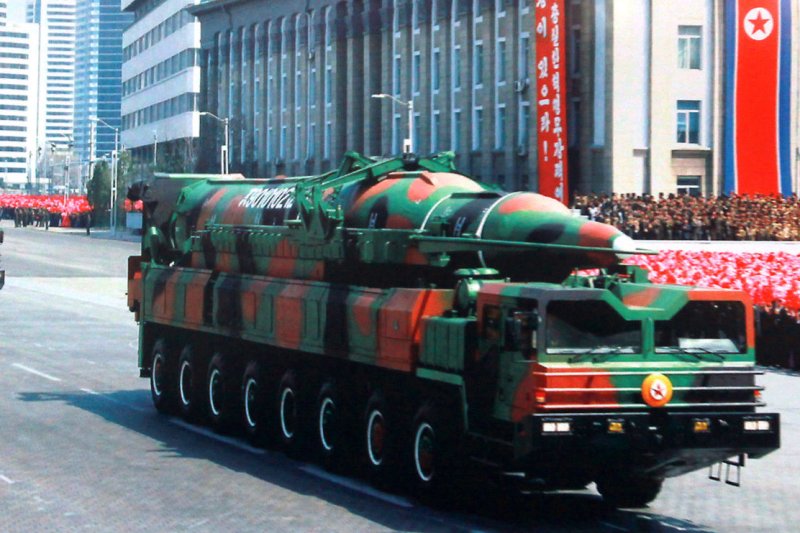A photo of a mobile, long-range missile launcher, which has alarmed the Pentagon, is displayed on a picture board in front of the North Korean Embassy in Beijing in 2013. Moscow said in statement Thursday Pyongyang should reconsider a return to the six-party talks. File Photo by Stephen Shaver/UPI |
License Photo
MOSCOW, March 3 (UPI) -- Russia encouraged North Korea to "make the right choice" in the wake of sweeping sanctions that were approved at the United Nations Security Council.
Russia, a permanent council member, had supported the bill after a round of negotiations with the United States, but the Russian Ambassador to the U.N. Vitaly Churkin had said the move should be followed by calls to North Korea to return to the six-party talks on denuclearization.
In Moscow Thursday, the Russian Foreign Ministry repeated the statement, saying that while Russia "recognizes the decision at the U.N. Security Council," Moscow "hopes North Korea returns to the negotiating table as agreed upon in the Sept. 19, 2005, Joint Statement," Yonhap reported.
The statement was a pledge from all six member countries -- North and South Korea, China, Japan, Russia and the United States -- to work toward the denuclearization of the Korean peninsula.
In a message to the North, Moscow said that its support of the U.N. resolution should "not be interpreted as a move to aggravate the economic and humanitarian conditions of the North Korean people."
Russia also issued a stern warning against the deployment of THAAD, or Terminal High Altitude Area Defense, in South Korea.
Moscow is against any attempts to "heighten tensions and provoke an arms race in the region," the Foreign Ministry said, urging all parties involved to reconsider the deployment of the U.S. anti-missile defense system.
Russia and North Korea have recently rekindled old ties and in 2015 stepped up mutual policy interests, which have culminated in the signing of an extradition treaty and measures against "illegal" persons. Human rights organizations have condemned the agreements and have stated North Koreans who are repatriated, including defectors, face serious punishmen,t including execution or a sentence of forced labor.
North Korea's human rights record has been at the center of a South Korea human rights bill that finally passed Wednesday, 11 years after it was introduced to parliament.
The law was approved after opposition party politicians walked out of parliament, after nearly a week of filibuster focused mostly on concerns regarding another bill on anti-terrorism. Opposition party members have said the anti-terrorism bill could increase the surveillance powers of the South's spy agency.















